Castro and the Colossus
The Cuban president, who is resigning after five decades in power, has caused his people suffering, but the giant to the north bears even greater responsibility for the island's plight.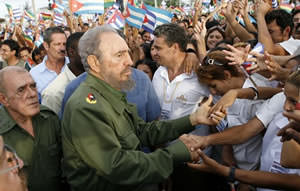
The resignation of Fidel Castro is more promising for the burnishing of his legacy than the mostly septuagenarian Cuban hard-liners in Miami and their fawning allies in the Bush administration would like to believe. After all, Mao Tse-tung is still honored in communist China, the fastest-growing capitalist power in the world, and former KGB agent Vladimir Putin is, at least for now, a very popular elected Russian leader.
Those hoping for a “freedom flotilla” of Cuban exiles returning to remake Havana in the image of 1959, threatening the very future of Las Vegas with legalized prostitution as well as gambling, are likely to be disappointed. Odds are that Castro’s successors, beginning with his rhetoric-weary brother, are likely to finally get serious, after decades of fitful starts and reversals, about ending the grip of a moribund statist economy. Reform leading significantly down the path of the Chinese model, or more appropriately that of Venezuela, which has thrown a lifeline to the ailing Cuban economy, is more likely than sudden upheaval.
But those changes will come too late to justify the suffering of the Cuban people for half a century at the hands of a revolutionary, as arrogant as he is idealistic, who witnessed his vision flounder on the rocks of an incredibly cynical U.S. policy. Prime responsibility for that suffering does go to the Colossus of the North, which in the pursuit of economic exploitation and Cold War paranoia consistently preferred Latin American dictatorships to serious experiments in popular rule and strangled the Cuban economy with an embargo in place for the almost five decades since Castro dared move against the U.S. corporations that claimed to own much of the island.
If Castro had attempted to listen to the better angels of his fervid imagination and pursued the path of democratic socialism rather than communist dictatorship, his effort most likely would have been subverted by the CIA, as was the case throughout the world, but it would have been an effort worth making. That was the promise of Castro’s famous Moncada speech, offered when he was a jailed young revolutionary dreaming of genuine populist power, and even he must have doubts as to whether, as he predicted back then, “history will absolve me” for the price paid in individual freedom for the revolution’s survival in power.
Not that the United States was likely to easily accommodate any populist challenge, as has been shown by the hysterical reaction to Venezuela’s finally sharing some of the oil loot with the poor. The failure of Fidel Castro’s Cuban revolution to provide a democratic socialist alternative was sealed by the decision of John F. Kennedy, that inexplicable hero of American liberalism, to invade an island that posed no threat to the United States. The U.S. had backed the brutal dictatorship of Fulgencio Batista, and the Kennedy administration even enlisted U.S. Mafia thugs, who had the run of Havana under Batista, in a failed attempt to assassinate Castro.
Only months into his presidency, Kennedy ramped up the Cold War — which Republican President Dwight D. Eisenhower had done his best to tamp down — by committing the United States to military confrontation on opposite ends of the world. In a subversion of Eisenhower’s decision not to send U.S. troops to Vietnam, Kennedy lied to the American public about the purpose of his decision to send “flood control” advisers to Saigon as well as the U.S. complicity in the death of Ngo Dinh Diem, the U.S. puppet once proclaimed the George Washington of Vietnam and then summarily murdered in a hit job overseen by Kennedy’s CIA operatives. And after Eisenhower resisted calls to overthrow Castro in reprisal for his nationalizing American-owned power grids, nickel mines and sugar plantations in Cuba, Kennedy, in the first months of his administration, ordered the Bay of Pigs invasion.
Yes, the dumbest moves of the Cold War were authorized by a lionized Democratic president and accelerated by his successor, another grand Democrat, Lyndon Baines Johnson. Both, as the record of memoirs, academic research and, in Johnson’s case, White House tapes has proved, were motivated by a fear of appearing weaker on national security than their Republican rivals. It provides a cautionary tale in considering the current presidential sweepstakes.
How easy it is to claim to champion universal human rights when you exempt your own country from judgment. When did the U.S. ever care about human rights in Cuba, or anywhere else in Latin America before Castro, if those rights conflicted with the rape of the region’s resources? And what a mockery we have made of the cause of democratic rule when our president, twice elected by the people, has created one of the world’s most fearsome symbols of torture on the U.S. “liberated” territory of Guantanamo, Cuba.
Your support matters…Independent journalism is under threat and overshadowed by heavily funded mainstream media.
You can help level the playing field. Become a member.
Your tax-deductible contribution keeps us digging beneath the headlines to give you thought-provoking, investigative reporting and analysis that unearths what's really happening- without compromise.
Give today to support our courageous, independent journalists.

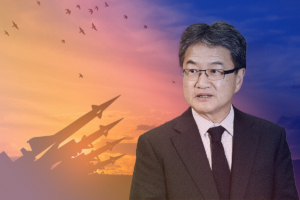
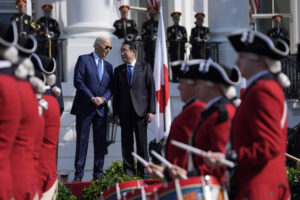
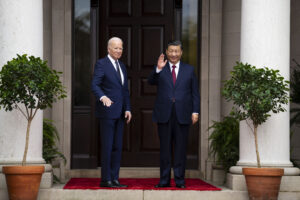
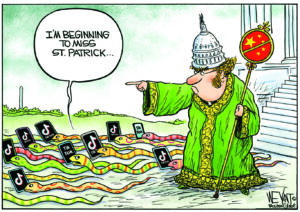

You need to be a supporter to comment.
There are currently no responses to this article.
Be the first to respond.